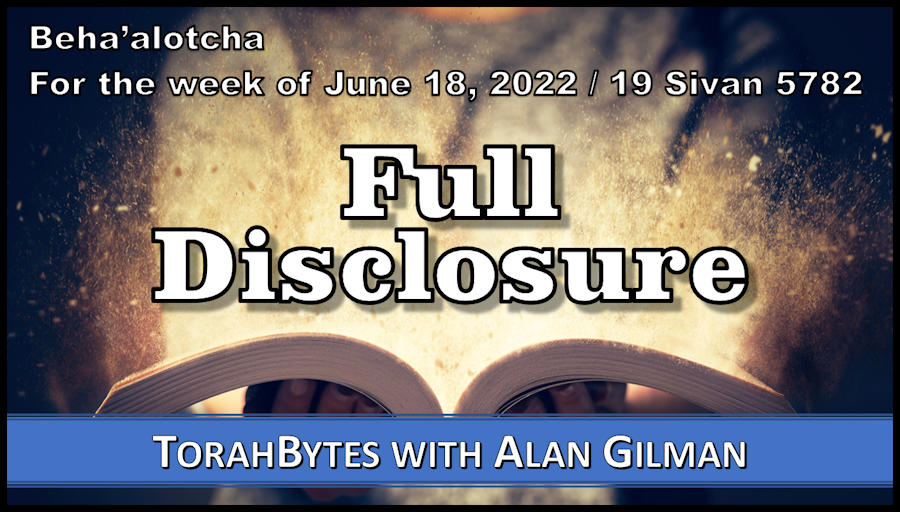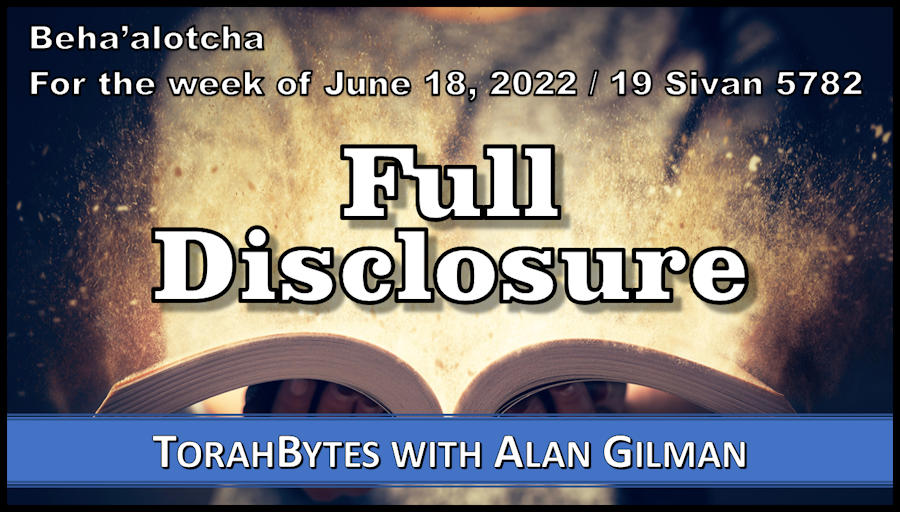
Full Disclosure
For the week of June 18, 2022 / 19 Sivan 5782

Beha’alotcha
Torah: B’midbar/Numbers 8:1 – 12:16
Haftarah: Zechariah 2:14 – 4:7 (English: 2:10 – 4:7)
Download Audio [Right click link to download]
Now the LORD spoke to Moses, saying, “Speak to Aaron and say to him, When you set up the lamps, the seven lamps shall give light in front of the lampstand.” And Aaron did so: he set up its lamps in front of the lampstand, as the LORD commanded Moses. (B’midbar/Numbers 8:1-3)
When I read certain parts of the Bible, in particular the Torah, the books of Moses, I wonder sometimes, what’s that doing there? Please don’t get me wrong. If God deems it to be part of his inspired written Word, I take no issue with it. It’s God’s Word after all, not mine. But why do I need to know this or that? All these instructions for the cohanim (English: priests), for example. They seem to be essential for a strict subset of the people of Israel. But what benefit does it and other such portions have to the average Joe or Joan?
I am aware that there is more to many of these passages than what might be obvious at first glance. At the same time, I can be skeptical of certain interpretations that may be doing nothing more than making stuff up. Take the verses I quoted at the beginning. It would be easy to lock on to the concept of light and run with it. Moses’ brother Aaron was given instructions to set up lamps inside the first of two highly restricted rooms contained within the mishkan (English: tabernacle). As far as we can tell, the purpose of the lamps was nothing more than practical: to provide light inside an otherwise completely dark environment. There’s nothing I know of in or around the passage to suggest otherwise. That said, if someone wants to use a passage like this to talk about how God is metaphorically our light in dark places – light signifying his knowledge that we need in order to live effective, godly, and productive lives – that’s great. But do we need this passage to know that? Aaron and his descendants needed it, of course. But what about the rest of us? Do we?
Yes we do. While perhaps there is a deeper meaning in such passages, there is something wonderful going on here. The core priestly function of ancient Israel was hidden from view. Every day, cohanim would enter the first room (the Holy Place) to tend the lamps, keep the incense burning, and replace the sacred loaves of bread. They would do this completely hidden away from view. Only select cohanim would ever get to see these unique furnishings and activities. Similarly, only one person, the Cohen HaGadol (English: the High Priest), would go into the second of the two rooms, the Holy of Holies, and ritually cleanse the Ark of the Covenant. And that happened only once each year. No one else would see it, but how do we know that? We know, because it’s explicitly described in Scripture.
To be honest, I don’t have extensive knowledge about other religions of the ancient Near East, but it seems to me that they were full of mystery. The inner workings of priests and such were for the priests alone. There seemed be a high value among both the religious leadership and their followers regarding mystery. Being clued out over what was really going on in the inner sanctum evoked a certain kind of awe that people valued.
It seems that’s still true today. Having a sense that the experts, be they religious or otherwise, possess information not accessible to the common person fuels a respect for them that allows us to trust their directions. It’s as if the more we don’t know, the more comfortable we feel entrusting our lives to them.
But that’s not God’s way. The God of the Bible is a god of disclosure. While the separateness of the innerworkings of the Mishkan evokes a sense of holiness – for a purpose I won’t delve into here – it’s not a secret. The Scriptures freely inform the people what’s going on beyond their view.
I have encountered Bible teachers who reference hard-to-understand passages as mysteries as if God wants us to simply accept all sorts of concepts just because we are told to. But that’s not the Bible’s use of the word “mystery.” In the New Covenant Writings, Paul commonly uses the word mystery to refer to something that was unknown in the past but has been made known in the present. It is not used to shut down questions and concerns about things that are hard to understand.
God delights in revealing himself and his ways to his people. While there are things beyond human understanding, God is not hiding in order to manipulate us in any way. Far from it! He longs to make himself known to us. If we find ourselves in the dark, it is only because we have not been willing to come into God’s light.
Scriptures taken from the English Standard Version